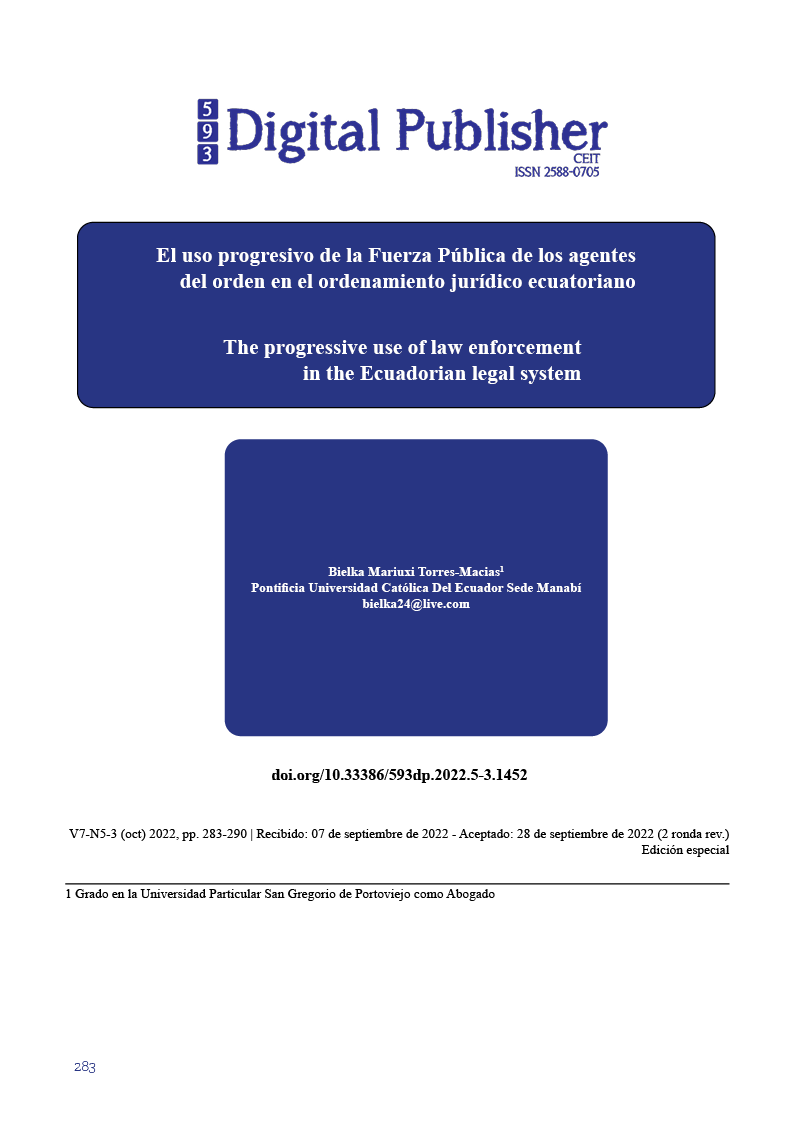The progressive use of law enforcement in the Ecuadorian legal system
Main Article Content
Abstract
The purpose of this investigation is to analyze conceptually and legally the progressive use of police force in the framework of the role of the State in guaranteeing citizen security and public order. It is therefore based on the principle that citizen security and public order are rights guaranteed by the State with responsibility for compliance by the National Police through the use of progressive force. However, a number of cases have been reported which indicate that the Ecuadorian legal system lacks protection when law enforcement officials use such use of force and resistance. In this regard, a legal and doctrinal study of the use of police force is carried out, within which principles, levels of force, resistance and other characteristics of this subject are analyzed. Following this, a mention is made of self-defence and with it, the difference of this legal figure, with the use of police force, is evident. From a methodological approach of a qualitative, documentary, descriptive and bibliographical nature we obtain information that results in the fact that citizen security is also one of the most relevant rights, because through this legal budget societies can develop in an environment of normality and free of actions that violate the democratic participation of citizens. It is concluded that there are shortcomings and gaps in the Ecuadorian legislation on this issue, because it is not correctly defined and adjusted to the right of those involved, So it denotes the helplessness of those who are in surveillance to guarantee our right to citizen security and these are law enforcement officers.
Downloads
Article Details

This work is licensed under a Creative Commons Attribution-NonCommercial-ShareAlike 4.0 International License.
1. Derechos de autor
Las obras que se publican en 593 Digital Publisher CEIT están sujetas a los siguientes términos:
1.1. 593 Digital Publisher CEIT, conserva los derechos patrimoniales (copyright) de las obras publicadas, favorece y permite la reutilización de las mismas bajo la licencia Licencia Creative Commons 4.0 de Reconocimiento-NoComercial-CompartirIgual 4.0, por lo cual se pueden copiar, usar, difundir, transmitir y exponer públicamente, siempre que:
1.1.a. Se cite la autoría y fuente original de su publicación (revista, editorial, URL).
1.1.b. No se usen para fines comerciales u onerosos.
1.1.c. Se mencione la existencia y especificaciones de esta licencia de uso.
References
Abad, Z. (2019). El archivo de la causa en violencia psicológica y los derechos del presunto agresor. (Tesis de maestría). Universidad Autónoma Regional de Los Andes, Ambato, Ecuador. https://dspace.uniandes.edu.ec/bitstream/123456789/11058/1/TUAEXCOMMDP020-2019.pdf
Brotat, R. (2014). La seguridad urbana: entre la seguridad ciudadana, el civismo y la convivencia en espacios públicos. (Tesis doctoral). Universidad Autónoma de Barcelona, Barcelona, España. https://www.tdx.cat/bitstream/handle/10803/134667/rbij1de1.pdf?sequence=1
Carpio, N. et al. (2020). El uso de la fuerza pública frente al derecho de resistencia. Iustitia Socialis, 5(2), 290-319, doi:http://dx.doi.org/10.35381/racji.v5i2.746
Cevallos, E. (2020). Uso progresivo de la fuerza policial Estudio de los lineamientos en Ecuador en perspectiva comparada con Perú y Colombia. (Tesis de maestría). Universidad Andina Simón Bolívar. https://repositorio.uasb.edu.ec/bitstream/10644/7568/1/T3281-MDE-Cevallos-Uso.pdf
CIDH. (2000). Comisión Interamericana de Derechos Humanos, informe sobre seguridad ciudadana y derechos humanos, 31 de diciembre de 2009, num.2.
Fassin, D. (2012). La fuerza del orden: una etnografía del accionar policial en las periferias urbanas. Buenos Aires: Siglo XXI Editores.
Garat, M. (2019). Los derechos fundamentales ante el orden público: una reformulación actual en el constitucionalismo español y uruguayo. (Tesis doctoral). Universidad de Sevilla, Sevilla, España. https://idus.us.es/bitstream/handle/11441/89695/M.%20Paula%20Garat%20-%20tesis%20-%20Los%20derechos%20fundamentales%20ante%20el%20orden%20p%C3%BAblico.pdf?sequence=1&isAllowed=y
Hernández, R. y Mendoza, C. (2018). Metodología de la investigación. Las rutas cuantitativa, cualitativa y mixta. Ciudad de México: Editorial Mc Graw Hill Education.
Passato, G. (2017). Análisis del Uso Progresivo de la Fuerza policial ejercida por la U.M.O. entre los años 2013 y 2016. (Tesis de pregrado). Universidad Central del Ecuador, Quito, Ecuador. http://www.dspace.uce.edu.ec/bitstream/25000/15122/1/T-UCE-0013-PO0001-2018.pdf
Torres, M. (2022). Uso progresivo de la fuerza en el ordenamiento jurídico penal ecuatoriano, control de la conservación del orden público y derechos humanos. (Tesis de pregrado). Universidad Central del Ecuador, Quito, Ecuador. http://www.dspace.uce.edu.ec/bitstream/25000/27063/1/FJCES-CD-TORRES%20MARIA.pdf
Velásquez, W. (2020). Análisis del uso de la fuerza en los procedimientos policiales en el Ecuador. https://dspace.uniandes.edu.ec/bitstream/123456789/11834/1/PIUSDAB061-2020.pdf


